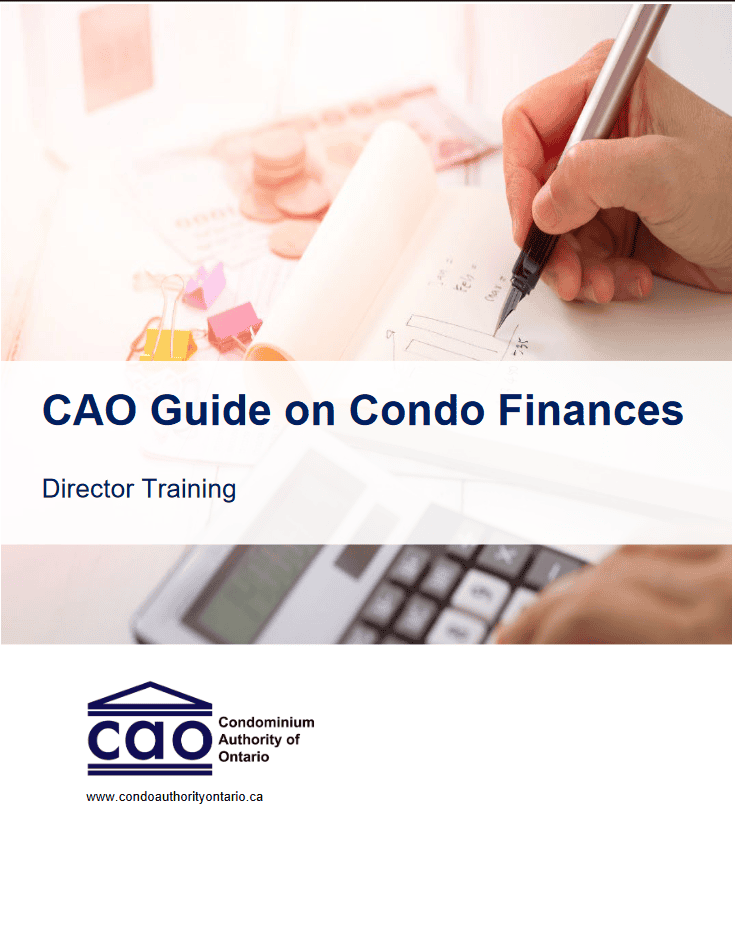GUIDE
CAO Guide on Condo Finances
The Finance guide helps directors make informed decisions related to budgeting, interpreting financial statements, handling reserve funds and more. Financial statements provide a picture of the financial position of your condo corporation at a fixed point in time or over a longer period of time, such as a month, a year, or a year to date.
Financial statements
This section covers the terms related to Financial Statements and its types.
- Definitions
- Users of Financial Statements
- Accrual Accounting
- Monthly Unaudited Financial Statements
- Components of the Unaudited Financial Statements
- Accounts and Schedules within the Unaudited Financial Statements
- Audited Financial Statements
- Differences between Draft and Final Audited Statements
- Approval Procedures for Draft Audited Statements
Bank accounts and investments
The largest asset for most condominium corporations is the money in the condo’s reserve fund, which is typically held either in a bank account or invested in eligible securities.
This section will provide condo directors with information on how to ensure that all activity related to the condo corporation’s money is in compliance with the provisions of the Condo Act.
- Bank accounts
- Investments
- Investment Plan
Annual budgets
Every condo owner pays common expenses fees. The amount paid by each owner is based on the total amount of funds required for managing the condo that year, including operating expenses and reserve fund contributions.
This section will describe the process for preparing a condo corporation’s budget. It will also discuss the implications of a budget where the condo has an operational surplus or deficit.
- Definition
- Contributions
- Purpose of Budgets
- Types of Budgets
- First Year Budget Guarantee
- Planning and Calculations
- Deficit and Surplus Budgets
- Identifying Elements of the Budget
Reserve fund and reserve funds studies
The Condo Act requires that the board of directors maintain a reserve fund. The fund ensures the corporation can finance major repairs or replacements of common elements or assets, if needed.
This section will provide directors with information on how to create and sufficiently fund a corporation’s reserve fund in accordance with the Condo Act.
- Reserve Fund definition
- Purpose of the Reserve Fund
- Contributions to the Reserve Fund
- Reserve Fund Study
- Income
Audits and auditors
Condo corporations are required to have an auditor appointed by the owners at each annual general meeting. A condo auditor conducts an audit on an annual basis, through which the auditor determines whether the condo corporation’s financial statements are materially accurate. An auditor will also ensure that the financial statements comply with the requirements in the Condo Act for audited financial statements.
This section will explain the purpose of an auditor and details regarding their obligations in conducting an annual audit.
- Definitions
- Requirements
- Purpose and benefits of an audit
- Selection, appointment and replacement of auditors
- Audit involvement
- Timing of the audit
- Audit procedures
- Audit outcomes and implications
- Contraventions
Taxes
Condo corporations must file taxes. This section will provide directors with guidance on filing tax returns for their respective condo corporations.
- Income Tax Status
- Filing Requirements
- Harmonized Sales Tax (HST)
Director training overview
The Condo Authority has created mandatory Director Training Module on finance for condo directors. The online training consists of 26 modules covering other important topics to help directors govern and carry out their responsibilities.
